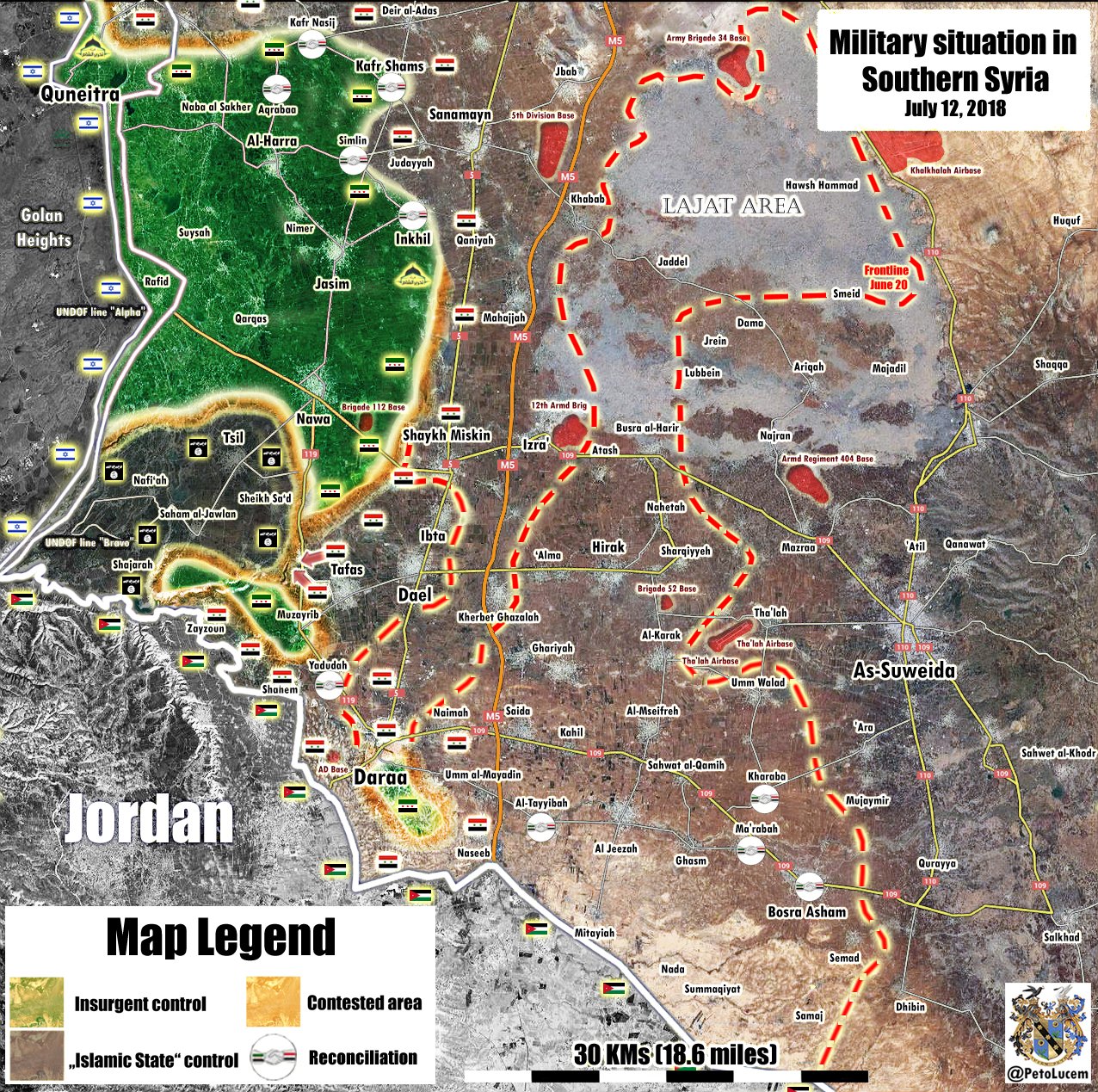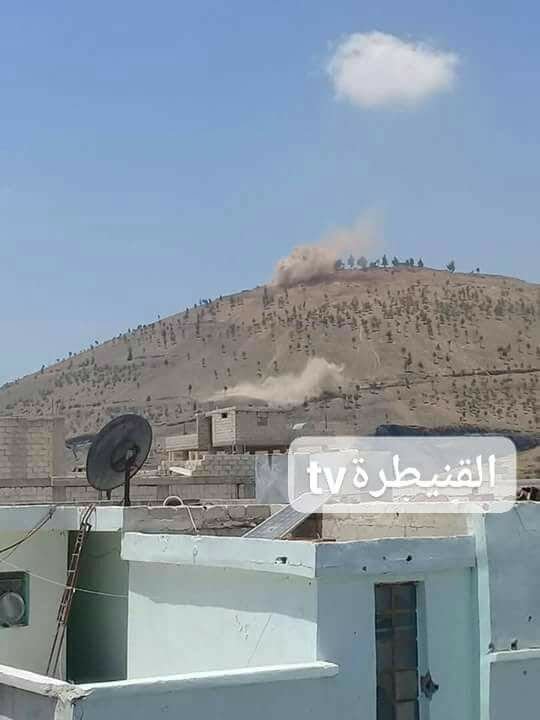There have been some serious advances of the Syrian army. Unfortunately, it is much less clear what is now under Syrian army control, what has been simply taken by the Syrian army, what has been taken after a more or less serious fight with Al Qaida, and what is in the process of giving away weapons to the Syrian army after successful reconciliation agreement.
But it looks certain that Al Mashara (with nearby Tal Mashara hill), Aqrabah, Al Harra with nearby Tal al Harra and Tal Ahmar hills are now under Syrian army control, together with everything East of it (for Al Tayhah, Kafr Shams, Umm al-Awsaj, Kafr Shams there has been such information, for Kafr Naseij not). Also that Inkhil and villages South of it are now under army control, and that the negotiations with Jasim were successful and handing over of weapons has started, seems not to be questioned. It seems like the village Al Harra itself was taken as a result of negotiations, while the nearby hill Tal al Harra has been taken after a quite heavy fight with Al Qaida. At least this sounds reasonable, given that the Tal Harra hill is quite decisive from a military point of view so that it is not good news for Al Qaida if the Syrian army controls it, and bombing a hill does not endanger civilians, so that there is no point of negotiating about a hill for the Syrian army. So, except that I think black line is more accurate because Agrabaa is under army control, this map seems quite accurate:

For the black shaded areas, there has been some information that they have switched to IS. So, mainly by negotiations, the Syrian army has reached quite important gains, essentially except for Nawa all that can be, without big exaggeration, named a town.
For illustration, a picture of that hill Tal al Harrah:
Not really impressive, but given that the distance to the Israeli occupied Golan Heighs is only 10 km, it is sufficiently impressive.
So we won't be seeing any of that. Naturally - the multipolar world will have less of this US-dominated "democracy" and "press freedom". And everybody will be better off without it.
If the US would give up these regime change games, and start to behave like a civilized state which respects other states, and does not do to others what they don't like if it is done by others (like influencing elections), this would be very helpful for freedom of press and democracy.
Syrian misery predates actual efforts to overthrow him - he is part of it, and his father before him. And the drought, and so forth. Not to forget Israel, either.
It was not enough to start such a civil war.
Remaining untouched by the US, as well. Putin saw to that.
Nonsense.
In reality, Trump's delay and avoidance of the specific sanctions allowed several Russian oligarchs (some named in the sanctions) who seem to be quite comfortable under Putin's management to get more of their money out of danger.
Maybe, but this is irrelevant for Putin. Fantasies about election meddling disposed of. Of course, Putin did not like all those investments of Russian money into London instead of Moscow, so, he thanks May and Trump for forcing them away. In the case of Trump, one can invent that Putin has asked him to do something in this direction, but in the case of May, this is quite implausible. Whatever, the Russian government is happy about these repressions against Russian oligarchs in London and the US, and the Russian media are full of glee for these predators too.
One common take in US circles is that Trump, from Putin's pov, is essentially just another oligarch - an American version of something familiar to him in Russia, whom he manipulates in similar ways. In that sense, his use of Iran and Syria as leverage is aimed more at other Americans (and Israelis, etc), and is a side or minor matter with Trump.
Maybe that's popular in some US circles, but it is completely off. America considers itself as the hub of the world and thinks Putin cares about leveraging it. Instead, Putin cares only about another thing - that the US gains no power to leverage Russia. Russia has also no big interest in forcing Israel to do something. If they need, they openly think about giving Syria S-300, this is usually enough.
After all is said and done, Assad will almost certainly remain and control most of the country. The only question, as far as I can tell, is what will happen in the north, where the Kurds are in control, and the U.S. has an interest, making sure ISIS doesn't come back?
The interest of the US is certainly not that the IS does not come back. Instead, there is some US interest in a Kurdish independent state, because such a state, hated by all its neighbors, would depend 100% on US support, thus, be an unsinkable airforce carrier for the US. If Russia succeeds to scare the US away (the equipment has already been presented - some partisan movement supported by local tribes against foreign aggressors, so that US troops already can move only from base to base in heavily protected convoys), then there will be a peace with some local autonomy for the Kurds. Else, the situation will be more complex and all this will last long.
How this will be presented by the US propaganda you can see from CptBork's postings.








